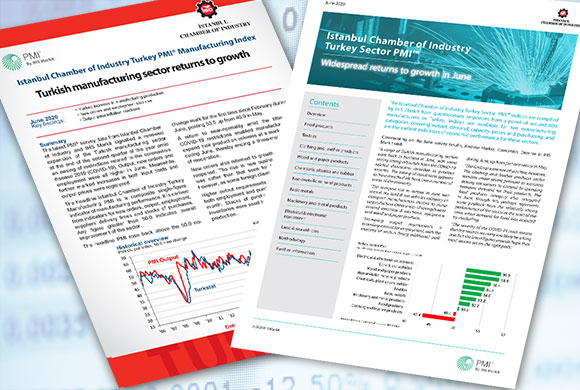News
ICI Turkish Manufacturing PMI June 2020 Report and Turkish Sectoral PMI Report Were Announced
- 02.07.2020
- News

Istanbul Chamber of Industry Türkiye Manufacturing PMI (Purchasing Managers Index), the fastest and most reliable reference for the manufacturing industry’s performance that is the leading indicator of economic growth increased to 53,9 in June realized over 50,0, the threshold value for the first time since February. Removing the restrictions against Covid-19 pandemic and adopting to the ordinary life style enabled the production volumes of manufacturers increase significantly during June and ended the three-month-slowdown period. New orders entered into growth area.
According to the June data of Istanbul Chamber of Industry, most of the manufacturing industry sectors recorded recovery. Production increased in all sectors excluding three sectors. The fastest increase in the production realized in the sectors of land and sea vehicles, electrical and electronic products and wooden and paper products. While seven sectors increased their employment level, chemicals, plastics and rubber products sector was in the leader position in business creation.
The results of Istanbul Chamber of Industry Türkiye Manufacturing PMI survey (Purchasing Managers Index), the fastest and most reliable reference for the manufacturing industry’s performance that is the leading indicator of economic growth were announced for the term of June 2020. Based on the survey results where all figures measured over 50,0, the threshold value point out to sectoPMI which was measured as 40,9 in May increased to 53,9 in June and realized over 50,0, the threshold value for the first time since February.
Removing the restrictions against Covid-19 pandemic and adopting to the ordinary life style enabled the production volumes of manufacturers increase significantly during June and ended the three-month-slowdown period. New orders entered into growth area upon the restart of customer operations. However, since some of the foreign customers could not operate, the increase in the new orders purchased from abroad was lower than the total amount of new orders. Increase in the production requirements enabled both employment and purchase operations to expand.
On the other hand, using the current stocks to support the increase in the production resulted in decrease in input stocks. Realization of increase in delivery durations in one of the highest rates of survey history pointed out that the failures in supply chain maintained their existence. Various survey participants stated to have experienced problems in transportation. Weakness in the monetary unit had an impact on the continuance of sharp increase on input costs of Turkish manufacturers in monthly basis. Inflation rate decreased compared to May however realized over the average level of the series. Increase in the input costs was reflected to the customers as increasing sales prices on average. Therefore, final product prices increased considerably and this increase realized in the highest rate of the last three months.
Andrew Harker, Economy Director of IHS Markit who evaluated the Istanbul Chamber of Industry Turkish Manufacturing PMI Data expressed that: “Recovery in the Turkish manufacturing industry gained speed in June and many sub-index in the survey passed to the growth area. However, since the Covid-19 crisis was very dense and strong, it is mandatory to put much more effort in the following months in order to compensate the production loss observed in the period when the pandemic was very effective. In this context, we hope that the growth will gain strength in the following months.”
Most of the sectors recorded recovery.
According to the June data of Istanbul Chamber of Industry, most of the manufacturing industry sectors recorded recovery. While the operation conditions in seven of 10 sectors followed up started to improve, some of them experienced strong recovery. Production increased in all sectors excluding three sectors. Land and sea vehicles, electrical and electronic products and wood and paper products sectors where the increase was pretty fast showed a strong recovery after a sharp shrinkage in April and May.
While the production gained stability in machinery and metal products sector, food products and garment and leather products experienced decrease. In the food sector, the demand which showed a strong increase because of stocking tendency at the beginning of Covid-19 crisis experienced a slowdown. Garment and leather products sector continued to be impacted by the demand deficiency in a negative direction.
Tendencies in new orders showed a production-compatibility appearance generally. However, new export orders showed a slowdown in seven of ten sectors. It resulted from the continuance of restrictions towards intercountry transitions and the continues impacts of pandemic on some export markets. Seven sectors increased their employment level and the number of the sectors which increased their employment levels increased for one time compared to May. While the chemistry, plastics and rubber products sector was in the leader position in business creation, a strong employment increase was experienced in land and sea vehicles sector. Based on the weakness in the monetary unit, input costs maintained its existence in high level generally. Covid-19 driven failures continued their existence in the supply chain even though many sectors entered into growth area.
Andrew Harker, Economy Director of IHS Markit who evaluated the results of June survey stated that: “Most of the Turkish manufacturing industry sectors started to operate in June. Some sectors showed a strong recovery after Covid-19 driven shrinkage recorded in the previous months. Refreshment was observed in many areas of economy with the loosening of restrictions.”